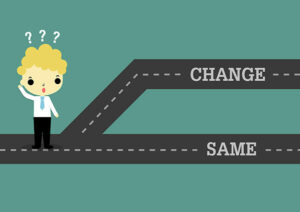Are you feeling stuck? Are you having a hard time making changes in your life, no matter how much you want to? You may be experiencing one of the five stages of change. In this blog post, we will discuss each stage in detail and provide tips on how to respond. It is important to understand these stages if you want to make lasting changes in your life.
Contents
What Are Stages Of Change?
 Stages of change is a theory that describes the process that people go through when trying to change a behavior. The theory is often used in the field of psychology to help people understand. And change addictive or harmful behaviors.
Stages of change is a theory that describes the process that people go through when trying to change a behavior. The theory is often used in the field of psychology to help people understand. And change addictive or harmful behaviors.
However, these stages can be applied to any type of change. Whether you want to quit smoking, start eating healthy, or begin an exercise routine.
The stages of change were first identified by James Prochaska and Carlo DiClemente in the 1970s. They found that people go through six different stages when trying to make a change: precontemplation, contemplation, preparation, action, maintenance, and termination. These stages are often represented by a curved line that goes from precontemplation to termination.
It is important to understand that stages of change provides a helpful tool for understanding the process of change. However, it is not meant to be a rigid framework. It provides guidelines for therapists, counselors, and health professionals.
6 Stages Of Change
There are six stages of change that have been identified by researchers. Let’s discuss these stages in depth;
Pre-Contemplation
In this stage, individuals are not considering changing their behavior. They may be in denial about their problem or feel hopeless about the situation. It is important to remember that people in this stage are not ready to change. And forcing them to do so will only result in resistance.
However, precontemplation is not a permanent state. People can move in and out of this stage. With the right circumstances, people in precontemplation can be moved to contemplation. It includes various therapies and interventions.
These stages are important to understand because they can help you recognize where you or someone else is in the process of change. And once you know that, it becomes easier to provide the appropriate support.
Contemplation
Contemplation is the stage where people are starting to think about changing their behavior. They may recognize that they have a problem but are not yet ready to take action. People in this stage are ambivalent about change; they can see both the pros and cons of making a change.
It is important not to push people in this stage too hard. If you do, they will likely move back to precontemplation. Instead, it is best to gently encourage them to keep thinking about change and explore what it would mean for them.
In addition, it is important to provide resources and information about change. This can help people in contemplation become more ready to take action.
Preparation
 In preparation, individuals are getting ready to make a change. They may start gathering information about their options or make small changes in their behavior. For example, someone who wants to quit smoking may throw out all their cigarettes and ashtrays. This is the time when people are most receptive to making a change.
In preparation, individuals are getting ready to make a change. They may start gathering information about their options or make small changes in their behavior. For example, someone who wants to quit smoking may throw out all their cigarettes and ashtrays. This is the time when people are most receptive to making a change.
More often, people don’t just jump into change. They go through different stages first. Researchers have identified six of these “change” or “transition” stages. In order to make lasting change, you need to first recognize which stage you’re in. Then, you can tailor your response accordingly.
Action
It is time to take decisive and concrete steps towards your goal. This is when you start making real changes in your behavior. Such as going to the gym three times a week or cutting out processed foods. The key here is to build up momentum and keep moving forward.
Also, action is defined by your level of commitment. Are you just going through the motions or are you really putting in the effort to change? It is important to be honest with yourself at this stage. Because, if you’re not, then you’re likely to slip back into your old ways.
Many people find it helpful to enlist the support of a friend or family member at this stage. Having someone to hold you accountable can be a big motivator.
Maintenance
 This is the stage where you are working hard to keep up the changes you have made. It can be tough at times, but it is important to stick with it. This is when many people find support groups or therapy helpful. Because they provide a sense of accountability and motivation.
This is the stage where you are working hard to keep up the changes you have made. It can be tough at times, but it is important to stick with it. This is when many people find support groups or therapy helpful. Because they provide a sense of accountability and motivation.
The key here is to find what works for you and to keep moving forward. Remember, change is a process and it takes time. So, don’t get discouraged if you have setbacks along the way.
It is also important to pay attention to your triggers at this stage. Because they can be a major factor in relapse. If you’re able to identify and avoid your triggers, then you’ll be one step closer to success.
Termination
The old behavior is now completely gone and has been replaced by the new one. This stage can be tricky because there is always the risk of relapse. However, if you have made it this far, then you have the strength and ability to overcome any obstacles.
The key here is to stay focused on your goals and to keep moving forward. Remember, change is a lifelong process. So, don’t get discouraged with some setbacks. Just keep moving forward and you’ll reach your goals in no time.
And that’s it! The six stages of change. Now, it’s up to you to put this into action and start making some changes in your life. Remember, change is a process and it takes time. But, if you’re committed to the goal, then you can achieve anything. So, go out there and make some changes.
How To Recognize The Need For Stages Of Change?

There are several factors that contribute to a person recognizing the need for change. Some of the situations where a person recognize the need of stages of change are as follows:
Dissatisfaction With Current Situation
The first and most common factor that leads to change is dissatisfaction. A person may be dissatisfied with certain things going on in their life, such as;
- Their job,
- Finances,
- Health,
- Relationships.
These are some of the situations, where a person needs a stage of change. It is this dissatisfaction that leads them to look for ways to improve their current situation.
Changes In Life Circumstances
Change can also be brought about by changes in life circumstances. This could include things like;
- Getting married,
- Having a baby,
- Getting a promotion,
- Moving to a new house.
All of these life changes can lead a person to re-evaluate their current situation. And make changes accordingly. However, always keep in mind that not all changes are bad. In fact, some changes can be very positive and lead to a much better life.
Pursuit Of A Goal
Another factor that can lead to change is the pursuit of a goal. This could be something like;
- Losing weight,
- Quitting smoking,
- Earning a degree.
A person may set a goal for themselves and then realize that they need to make changes in order to achieve that goal. This is often the case with goals that require a lot of effort and dedication.
So, these are some of the situations where a person needs stage of change. By recognizing the need for change.
Encouragement From Others
Sometimes, a person may need a little push from others to recognize the need for stages of change. This could come in the form of;
- Friends,
- Family,
- Co-workers,
- Spouse.
These people may see the potential for change in the person and encourage them to make the necessary changes. This is often done by sharing their own experiences or success stories.
How To Respond To Stages Of Change?
 When you recognize the need for stages of change. Then, it is important to know how to respond. Here are a few tips:
When you recognize the need for stages of change. Then, it is important to know how to respond. Here are a few tips:
- Acknowledge that change is hard and takes time.
- Encourage baby steps and celebrate each accomplishment along the way.
- Be understanding if someone falls back into old habits – it’s part of the process.
- Provide resources, information, and support to help with the journey.
- Most importantly, never give up hope! Change is possible for everyone.
Response to stages of change is vital to the process. These tips will help you on your way to a better life. Also, never give up hope! Change is possible for everyone.
Change can be daunting, but remember that you are not alone. In addition, this is important work that will improve your life. And the lives of those around you. Stages of change is somehow to live a better life. So that you can be the best version of yourself.
What Influences Stages Of Change?
There are certain factors that can influence the stages of change. Some of these include:
- The severity of the problem or issue.
- How much it is impacting daily life.
- Whether or not there are others around who are also experiencing similar issues.
- How motivated someone is to change.
- What resources and support are available.
- Previous attempts at changing this behavior and whether or not they were successful
All of these factors can play a role in where someone falls on the scale. And how likely they are to take action. It’s important to remember that everyone is different. So what may work for one person may not work for another. The best approach is to tailor any response to the individual based on their unique circumstances.
Furthermore, the influences on the stages of change are not static. They can change over time. As someone’s circumstances or motivation shifts. So too may their stage of change. It’s important to be aware of these changes and adjust accordingly.
Conclusion
To recap, it can be helpful to think of the stages of change as a process. That starts with pre-contemplation, or not yet being aware of the need to make a change. From there, people move into contemplation or recognize they need to take action. Once someone takes action, they may find themselves in maintenance mode for a while. Working to prevent relapse and keeping up the positive changes they’ve made.
But the journey doesn’t end there. People can (and do) go through the stages of change again and again throughout their lives. The key is to become attuned to the signs that indicate it’s time for a change and then having a plan in place to make that happen.
A Word From Therapy Mantra
Your mental health — Your psychological, emotional, and social well-being — has an impact on every aspect of your life. Positive mental health essentially allows you to effectively deal with life’s everyday challenges.
At TherapyMantra, we have a team of therapists who provide affordable online therapy to assist you with issues such as depression, anxiety, stress, workplace Issues, addiction, relationship, OCD, LGBTQ, and PTSD. You can book a free therapy or download our free Android or iOS app.
Reference Blog– https://therapymantra.co/therapy-types/equine-therapy/


